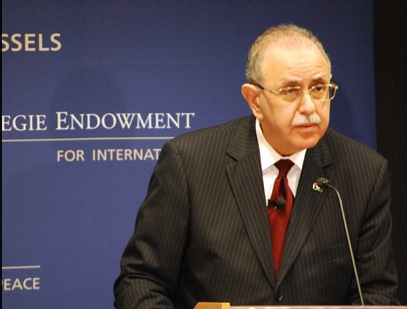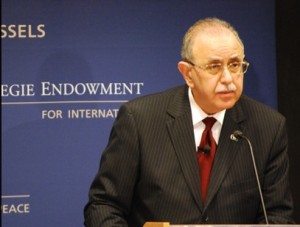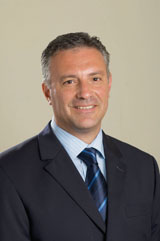Tripoli, March 11: Prime Minister Abdurrahim Al-Kib said . . .[restrict]on Friday that Russian companies are welcome in Libya and that “we will honor our contracts” signed with them so long as they did not serve the interests of anyone connected to the old regime. Because of that they would have to be reviewed he said.
He said that Libya was unhappy with Russia’s approach to Libya during the revolution.
Speaking at Washington’s Carnegie Endowment for International Peace, the prime minister expressed regret at the position taken by Moscow last year. He asked if the Russian government really understood Libya and what had been taking place there.
“We wished that Russia would have felt what was going on during the eight months of the revolution. Did they see what was happening?” he asked. He hoped it was the case that they had not. Otherwise, it might have been a case of seeing what was happening and not caring. Or Moscow was simply pursing a political agenda that served their own interests.
It had that right, he agreed.
“Are we happy with how Russia handled the situation [last year]? Respectfully, no.” He said that Russia was welcome to come back but it had to understand the scale of what had happened last year. It had been, for Libyans, a costly revolution. “I hope our Russian friends realize that,” he said
Al-Kib was visiting the US for a few days.
During the revolution, Russia criticized the western-led military operations that attacked Qaddafi’s forces claiming that it exceeded the UN’s no-fly resolution. The criticism was repeated by Moscow’s UN ambassador at the Security Council last week.
Despite Al-Kib’s olive branch on Friday, Russia on the same day again attacked the NATO involvement, this time criticising UN investigators for failing to properly investigate deaths caused by NATO bombing during the revolution.
A report last week by independent investigators for the UN Human Rights Council said NATO had caused civilian deaths, but that it had taken “extensive precautions to ensure civilians were not killed”.
Maria Khodynskaya-Golenishcheva, a diplomat at the Russian UN mission in Geneva, said that the report should have highlighted the deaths caused by NATO air strikes last year which she said included children and Libyan journalists.
“In our view, during that [NATO] campaign many violations of international law and human rights were committed, including the most important right, the right to life,” she said.
The report, she said, should have assessed these acts and those who wrote it should have been more insistent on demanding information from NATO.
Philippe Kirsch, head of the UN’s commission of inquiry on Libya, said NATO had not provided him with all of the information requested.
“We know NATO had an enquiry and we asked to be informed of the results and we asked to meet with officials and could not. We asked to be given imagery of attacks and did not receive this,” he said in a press conference on Friday.
The 200-page report which investigated violations of international human rights law spoke of a “credible report” that Libyan forces had removed children’s bodies from a hospital morgue and took them to the site of a NATO airstrike.
The US ambassador to the UN Human Rights Council, Eileen Chamberlain Donahoe, praised NATO for working with the commission.
“We commend NATO for fully cooperating with the commission and for providing a significant amount of information much of which had to be declassified to assist them in their work,” she said.
The UN inquiry claimed that both sides in the conflict committed war crimes and that Qaddafi forces had committed crimes against humanity.
It called on the Libyan government to investigate the circumstances of Qaddafi’s death of Gaddafi, saying it had been refused a copy of the autopsy report. [/restrict]









